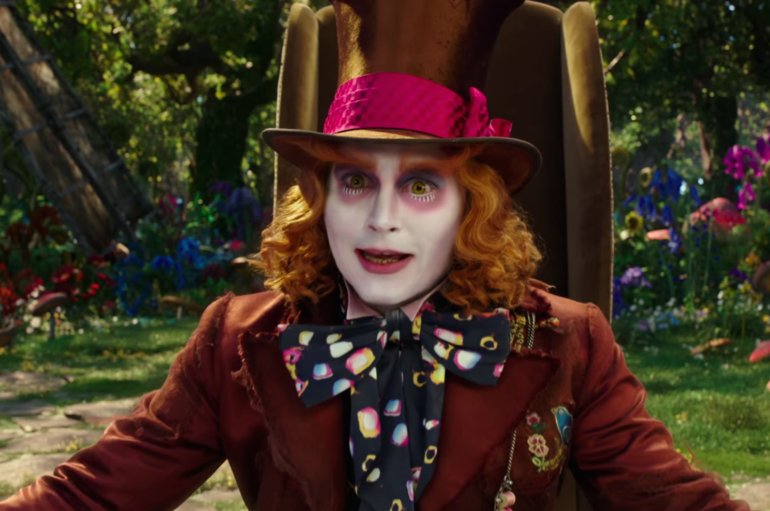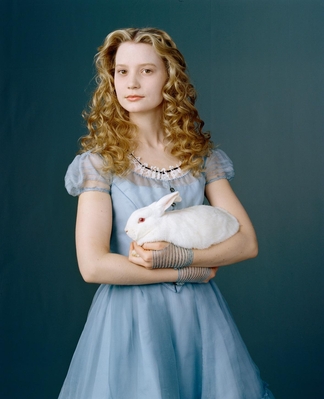How much you enjoy this new version of Alice Through The Looking Glass will be directly proportional to how much you revere Lewis Carroll’s original text. If you love the original you will be perplexed, wondering if you have come into the correct screening. But if you don’t mind some liberties taken with the story or, more than liberties, if you don’t mind the original story kidnapped, wrapped in chains and thrown into a well, or if you just don’t know the book, then you might actually enjoy what’s on offer.
Tim Burton’s Alice in Wonderland was an early experiment with modern 3D, taking more than $1 billion in box office, one of the 30 highest-grossing films of all time. Such tremendous, unexpected success demands a sequel. Six years later. Burton’s film veered away from the Lewis Carroll story, including the classic elements (Cheshire Cat, etc) but with an odd, some might say unnecessary, slant. Alice (Mia Wasikowska, pictured below) was 19, returning to her youthful fantasies, not the much younger girl exploring her current fantasies as in the original.
 The new film begins with the same cast and atmosphere or the Burton original, set several years after the first. Alice, now a swashbuckling sea captain, deals spiritedly with pirates before returning home to stuffy Victorian Britain. The chinless Hamish (Leo Bill), snubbed by Alice in the first film, humiliates her by taking away her ship away. Distraught, Alice finds the butterfly Absolom (voiced by Alan Rickman in one of his final roles) who leads her through a mirror - a looking glass - and into Wonderland, where things are also glum.
The new film begins with the same cast and atmosphere or the Burton original, set several years after the first. Alice, now a swashbuckling sea captain, deals spiritedly with pirates before returning home to stuffy Victorian Britain. The chinless Hamish (Leo Bill), snubbed by Alice in the first film, humiliates her by taking away her ship away. Distraught, Alice finds the butterfly Absolom (voiced by Alan Rickman in one of his final roles) who leads her through a mirror - a looking glass - and into Wonderland, where things are also glum.
The Hatter (a spectacularly creepy Johnny Depp, pictured below) pines for his family, presumed dead. Alice, inspired to help the Hatter, must steal the Chronosphere, a Tardis-cum-motorbike time machine from Sasha Baron Cohen’s clockwork Time who sports a strong German (or possibly Swiss) accent. Now Alice can get to the bottom of The Hatter’s misery and also discover why the Queen of Hearts, a wonderfully brattish Helena Bonham Carter, is such a stinker.
 This all bears as much resemblance to the original text as quantum computing does to Pokemon. But it does make for a sequel to the first film. Burton is not at the helm, passing on to James Bobin, who has a long association with Baron Cohen from the Ali G days, and directing both of the recent Muppets films. As co-producer, Burton’s fingerprints are all over the first-class steampunk set design, costumes and beautiful art direction. But without him driving the boat, the film lacks some of the weirdness he brings. Alice Through the Looking Glass has a far more conventional story as a result: a quest.
This all bears as much resemblance to the original text as quantum computing does to Pokemon. But it does make for a sequel to the first film. Burton is not at the helm, passing on to James Bobin, who has a long association with Baron Cohen from the Ali G days, and directing both of the recent Muppets films. As co-producer, Burton’s fingerprints are all over the first-class steampunk set design, costumes and beautiful art direction. But without him driving the boat, the film lacks some of the weirdness he brings. Alice Through the Looking Glass has a far more conventional story as a result: a quest.
While the story meanders far from the original, some of Carroll’s distinctive dialogue creeps in at places, notably the nonsense jokes about time and the perception of time. Talking of time, six years is a long wait in Hollywood, and the timing of this sequel is curious. Those aged 10 for the original would be 16 now, too old to be interested in this. Anyone now the perfect age for the sequel would have been too young to see the original. This means that the film needs to stand on its own, but it barely does. If you don’t know the characters or the slants of Carroll's original story then the story is perplexing at best.
Some scenes are scary, the Victorian design dark and menacing, and may be a bit much for younger viewers. But if you can see past the problems, Alice Through the Looking Glassis enjoyable, visually spectacular and finally satisfying.
ALICE'S ADVENTURES ON STAGE AND SCREEN
Alice, Scottish Ballet. It should be a capital crime to attempt an Alice ballet - off with their heads
Alice's Adventures in Wonderland, Royal Ballet. Even the best butter would not help this plot-less evening
Alice's Adventures Under Ground, Barbican. Gerald Barry's crazy velocity berserks both Alice books in rude style
 Alice in Wonderland. Tim Burton takes on the fantasy classic
Alice in Wonderland. Tim Burton takes on the fantasy classic
Alice in Wonderland, BBCSO, Brönnimann, Barbican. A curious tale gets a riotous operatic telling from composer Unsuk Chin
Jan Švankmajer's Alice. The great Czech animator's remarkable first full-length film
wonder.land, National Theatre. Damon Albarn’s Alice musical has fun graphics, but a banal and didactic storyline
Overleaf: watch the trailer to Alice Through the Looking Glass

 The new film begins with the same cast and atmosphere or the Burton original, set several years after the first. Alice, now a swashbuckling sea captain, deals spiritedly with pirates before returning home to stuffy Victorian Britain. The chinless Hamish (Leo Bill), snubbed by Alice in the first film, humiliates her by taking away her ship away. Distraught, Alice finds the butterfly Absolom (voiced by
The new film begins with the same cast and atmosphere or the Burton original, set several years after the first. Alice, now a swashbuckling sea captain, deals spiritedly with pirates before returning home to stuffy Victorian Britain. The chinless Hamish (Leo Bill), snubbed by Alice in the first film, humiliates her by taking away her ship away. Distraught, Alice finds the butterfly Absolom (voiced by  This all bears as much resemblance to the original text as quantum computing does to Pokemon. But it does make for a sequel to the first film. Burton is not at the helm, passing on to James Bobin, who has a long association with Baron Cohen from the Ali G days, and directing both of the recent Muppets films. As co-producer, Burton’s fingerprints are all over the first-class steampunk set design, costumes and beautiful art direction. But without him driving the boat, the film lacks some of the weirdness he brings. Alice Through the Looking Glass has a far more conventional story as a result: a quest.
This all bears as much resemblance to the original text as quantum computing does to Pokemon. But it does make for a sequel to the first film. Burton is not at the helm, passing on to James Bobin, who has a long association with Baron Cohen from the Ali G days, and directing both of the recent Muppets films. As co-producer, Burton’s fingerprints are all over the first-class steampunk set design, costumes and beautiful art direction. But without him driving the boat, the film lacks some of the weirdness he brings. Alice Through the Looking Glass has a far more conventional story as a result: a quest. Alice in Wonderland
Alice in Wonderland